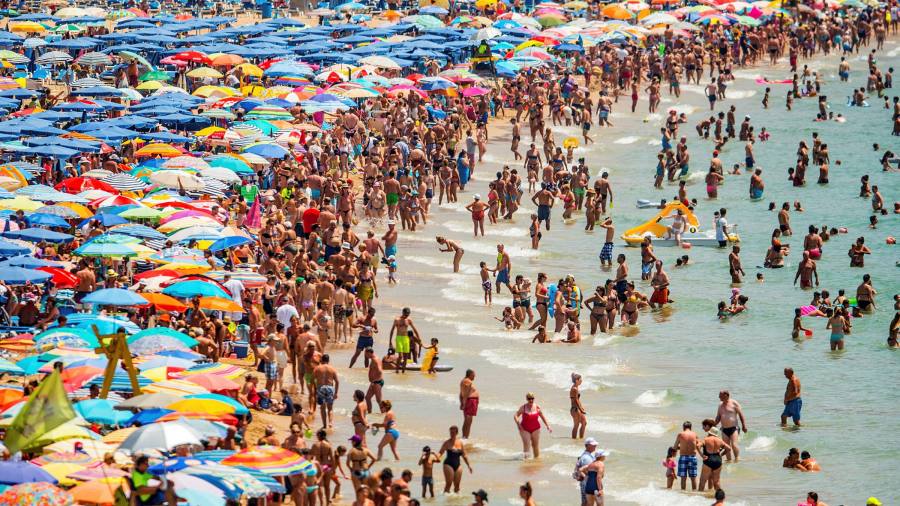[ad_1]
The travel industry has criticised the UK government after ministers warned it was too soon for Britons to book holidays at home or abroad.
Grant Shapps, transport secretary, said on Wednesday that people should not book holidays internationally or domestically until there was a clearer plan for exiting lockdown, due to be announced by prime minister Boris Johnson later in February.
Britons should “do nothing at this stage,†he said, adding that under current lockdown restricitons, anyone in the UK is currently banned from leaving the country for a holiday.
Michael O’Leary, the chief executive of Ryanair, accused ministers of “posturing†and said there is “almost a hysteria†about stopping people from travelling, particularly given the early success of the UK’s vaccination programme.
The airline boss said the UK would never be able to seal itself off from the world to stop new variants of Covid-19 entering the country, and that travel should be opened up as soon as vulnerable people have been vaccinated.
“I think there is going to be an unanswerable case to allow people to move freely again,†he said. “What’s the point of a successful vaccination programme if you aren’t going to use it to lift restrictions?â€
Glyn Jones, chief executive of London Southend Airport, said Shapps’ comments were “the last thing we need†and that the summer season is “at serious riskâ€.
One executive from a major UK holiday provider said: “We don’t see — unless something goes wrong — how the government can reasonably stop travel in a nation that’s mostly vaccinated by May.â€
The warnings over domestic and international travel come days after holiday companies in the UK reported surging bookings for staycations.Â
Last month health secretary Matt Hancock said he expected a “great British summer†and that he would be holidaying in Cornwall.
From Monday the government is preparing to roll out tough new measures for travellers arriving into England in an effort to thwart the spread of new variants of Covid-19.
Arrivals from 33 “red list†countries will have to quarantine in a hotel for 10 days, while all travellers will be required to take two tests — on day two and day eight — in addition to one they must take 72 hours before departure.
Countries on the UK’s ‘red list’
Angola, Argentina, Bolivia, Botswana, Brazil, Burundi, Cape Verde, Chile, Colombia, Democratic Republic of Congo, Ecuador, Eswatini, French Guiana, Guyana, Lesotho, Malawi, Mauritius, Mozambique, Namibia, Panama, Paraguay, Peru, Portugal, Rwanda, Seychelles, South Africa, Suriname, Tanzania, United Arab Emirates, Uruguay, Venezuela, Zambia, Zimbabwe
The travel and tourism industry said the latest measures could be ruinous for the summer holiday season and has called for a road map out of the increasingly strict restrictions.
“Losing one summer was very awkward, losing two summers would be a disaster,†Jones said.
Shapps defended the new travel restrictions, which include the threat of a 10-year jail sentence for concealing a trip to one of the red list destinations, telling the BBC that introducing a new variant of Covid-19 could result in “impacting on a lot of people’s lives or indeed losing a lot of people’s livesâ€.
He said that a lengthy prison sentence would only occur for those who “deliberately went out of their way to mislead and lie†about their travel and avoid the rules.
The potential 10-year jail sentence was sharply criticised by two former Conservative attorneys-general — Dominic Grieve and Sir Geoffrey Cox, who questioned whether the punishment was proportionate.
Charles Walker, a senior Conservative MP, said that health secretary Matt Hancock’s announcement on the jail terms was “a really stupid thing to sayâ€, adding that it “demeans his office and position around the cabinet tableâ€.
Airlines and airports are privately concerned that they are still waiting to hear details on how they should deal with people arriving from high-risk countries, according to two people familiar with the discussions.Â
Airports have told the government they do not have enough staff to marshal passengers through terminals, and have instead suggested Border Force staff be used. Thousands of staff have been sacked or furloughed following the collapse in passengers caused by the Covid-19 pandemic.Â
There is also concern within the industry that five days from the quarantine system going live there is no directive on whether to segregate passengers from red list countries, either on planes or at the airports. Direct flights from the high-risk countries are banned, meaning passengers will have to mix with people arriving from other countries.
Additional reporting: Alice Hancock
The current nationwide lockdown rules in England
-
The main restriction is a firm stay-at-home message
-
People are only allowed to leave their home to go to work if they cannot reasonably do so from home, to shop for essential food, medicines and other necessities and to exercise with their household or one other person — once a day and locally
-
The most clinically vulnerable have been asked to shield
-
All colleges and primary and secondary schools are closed until a review at half-term in mid-February. Vulnerable children and children of critical workers are still able to attend while nursery provision is available
-
University students have to study from home until at least mid-February
-
Hospitality and non-essential retail are closed. Takeaway services are available but not for the sale of alcohol
-
Entertainment venues and animal attractions such as zoos are closed. Playgrounds are open
-
Places of worship are open but one may attend only with one’s household
-
Indoor and outdoor sports facilities, including courts, gyms, golf courses, swimming pools and riding arenas, are closed. Elite sport, including the English Premier League, continues
-
Overseas travel is allowed for “essential†business onlyÂ
Full details are available on the government’s official website.
[ad_2]
Source link





